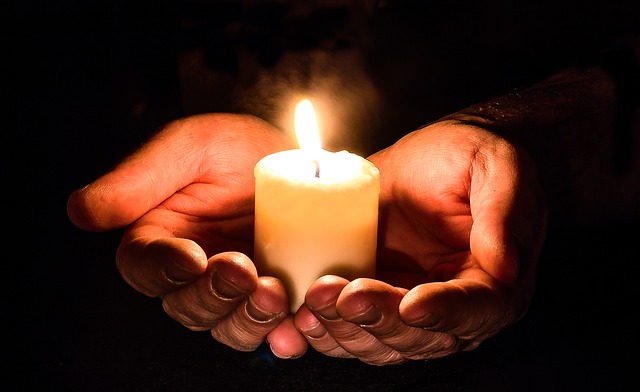Burning Out Like A Candle – Recently Deceased In French Posted by John Bauer on Mar 7, 2019 in Vocabulary
There’s some vocabulary that can be hard to talk about. Not because it’s difficult or different, but because it’s tied to emotions, memories, or history.
One of the hardest things to talk about, regardless of the language, is someone close passing. It can be hard to think of anything when les emotions are fresh and les larmes (the tears) have yet to dry.
When I unfortunately needed to use ce genre de vocabulaire (this kind of vocabulary) with mes amis et mes collègues (my friends and coworkers), there was a lesson waiting in la tristesse (the sadness).
When someone has recently passed, the formal way to refer to them en anglais is with the late:
The late David Bowie
So when I needed to talk about my late grandfather and his passing, I didn’t have the mind to not think in English and ended up saying something very odd to mon ami:
Ça va John ?
Non… Mon grand père est en retard.
Il est en retard ? Il vient en France ?You alright John?
No… My grandfather is late.
He’s late? Is he coming to France?
In retrospect I see the confusion and humor in such a statement, but at the time all I could do was be as blunt as possible:
Il est mort.
Je suis désolé… Je savais pas que tu voulais dire ça. Mes condoléances.He is dead.
I am sorry… I didn’t know you wanted to say that. My condolences.
I was too triste (sad) to care about finding out the proper way to say what I wanted. However, when I heard overheard mon ami explaining the situation they used a term I wasn’t familiar with:
Feu son grand père
His late grandfather
I accidentally learned of ma faute (my mistake) and even though I heard the right way to say what I wanted, I didn’t understand how feu worked until much, much later.
Sometime after the awkward exchange with mon ami, I saw David Bowie mentioned in the news with a term I hadn’t thought of in months:
Feu David Bowie
The late David Bowie
In a more clear mental state, I clearly remembered le mot (the word). I thought the idea of using fire (feu) to refer to someone who has recently passed as very poetic and the clear imagery of a flame slowly burning out made le vocabulaire stick in my head like a bright light.
It’s also not all what it’s supposed to mean or where feu in this context comes from. Feu comes from le latin (latin) word fatum (destiny) via fatutus which used to be strongly connected to misfortune and other grim things before becoming associated with la mort (death). Several centuries later it gained its modern meaning of having recently deceased.
Unlike English term the late, feu can be used for both for people and things. So something like:
Feu le restaurant
The late restaurant
is perfectly fine en français.
L’adjectif (the adjectif) can get a bit more complex, but the rules are easy. When feu is used after an article, it has to agree with the noun it’s modifying and if it’s used without or before an article then it’s always simply feu:
Le feu David Bowie
Feu David Bowiela feue Carrie Fisher
Feu Carrie FisherLa feue musicienne
Feu la musicienne
How I originally remembered le vocabulaire could not be farther from what it actually means or where it comes from, but it still worked as a useful way to remember le mot. It may seem strange, but similar things often help make learning le vocaublaire easier, even if it’s for topics that are difficult to talk about.

Build vocabulary, practice pronunciation, and more with Transparent Language Online. Available anytime, anywhere, on any device.




